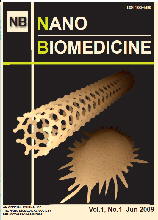
Nano Biomedicine
ORIGINAL ARTICLE
Modification of Composite Resin Surface with Carbon Nanotubes Enhances Cell Proliferation
Saori TANAKA1,2 , Hirofumi MIYAJI2, Erika NISHIDA2, Kana INOUE2, Saori MIYATA2, Akihito KATO2, Izumi KANAYAMA2, Shusuke MURAKAMI2, Kohei KAWAMOTO2, Bunshi FUGETSU3, Toru TANAKA4, Hiroko TAKITA5, Tadashi IIZUKA5, and Masamitsu KAWANAMI2
1Division of General Dentistry Center for Dental Clinics,
2Department of Periodontology and Endodontology, Hokkaido University
Graduate School of Dental Medicine, Sapporo, Japan
3Nano-Agri Lab, Policy Alternatives Research Institute,
The University of Tokyo, Tokyo, Japan
4Department of Restorative Dentistry,
5Support Section for Education and Research, Hokkaido University
Graduate School of Dental Medicine, Sapporo, Japan